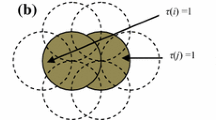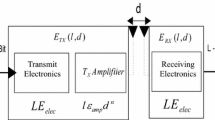Abstract
In this paper, the distributed estimation of an unknown target parameter through a power-constrained wireless sensor networks (WSN) including clusters is investigated. Data collection algorithm includes routing and scheduling. In WSN, sensor nodes observe the environmental events, perform a local data compression and at the first step, forward the results to a cluster head (here it is called fusion center). In this study, cluster head (CH) provides a final estimation of the observed target parameter using collected data. Then CH sends the estimation results to the sink. The main purpose of the proposed algorithm is to extend network lifetime while the target parameter is estimated with the desirable precision. To achieve this goal, following three objects are regarded: (1) proposing estimation model for different target parameter types, (2) proposing intra cluster scheduling/routing algorithm for collecting data inside the clusters according to the estimation model requirements and (3) proposing inter cluster routing in order to transmit the estimation process results to the sink. According to the inherent characteristics of WSN applications, we consider the unknown target parameter as a random variable with a known prior distribution function. Based on the application, different prior functions are admissible. In this paper we investigate the impact of different prior functions on estimation process performance. Simulation results show that the proposed algorithm achieves its goals.






















Similar content being viewed by others
References
Tubaishat, M., & Madria, S. (2003). Sensor networks: An overview. IEEE Potentials 22(2), 23.
Kumar, S., Shepherd, D., & Zhao, F. (2002). Collaborative signal and information processing in micro-sensor networks. IEEE Signal Processing Magazine, 19, 13–14.
Chang, J. H., & Tassiulas, L. (2004). Maximum lifetime routing in wireless sensor networks. IEEE/ACM Transactions on Networking, 12(4), 609–619.
Cohen, K., & Leshem, A. (2010). A time-varying opportunistic approach to lifetime maximization of wireless sensor networks. IEEE Transactions on Signal Processing, 58(10), 5307–5319.
Ayanoglu, E. (1990). On optimal quantization of noisy sources. IEEE Transactions on Information Theory, 36(6), 1450–1452.
Bertrand, A., Szurley, J., Ruckebusch, P., Moerman, I., & Moonen, M. (2012). Efficient calculation of sensor utility and sensor removal in wireless sensor networks for adaptive signal estimation and beamforming. IEEE Transaction on Signal Processing, 60, 5857–5869.
Aysal, T. C., & Barner, K. E. (2008). Constrained decentralized estimation over noisy channels for sensor networks. IEEE Transactions on Signal Proceesing, 56(4), 1398–1410.
Huang, Y., & Hua, Y. (2012). On energy for progressive and consensus estimation in multihop sensor networks. IEEE Signal Processing Magazine, 59(8), 3863–3875.
Akyildiz, I. F., Su, W., Sankarsubramaniam, Y., & Cayirci, E. (2002). Wireless sensor networks: A survey. Computer Networks, 38, 393–422.
Luo, Z. Q. (2005). Universal decentralized estimation in a bandwidth constrained sensor network. IEEE Transactions on Information Theory, 51(6), 2210–2219.
Chaudhary, M., & Vandendorpe, L. (2012). Power constrained linear estimation in wireless sensor networks with correlated data and digital modulation. IEEE Transactions on Signal Processing, 60(2), 570–584.
Yuh-Ren, T., & Cheng-Ju, C. (2011). Cooperative information aggregation for distributed estimation in wireless sensor networks. IEEE Transaction on Signal Processing, 59(8), 3876–3888.
Bertrand, A., & Moonen, M. L. (2011). Distributed adaptive estimation of node-specific signals in wireless sensor networks with a tree topology. IEEE Transactions on Signal Processing, 59(5), 2196–2210.
Cui, S., Goldsmith, A., & Bahai, A. (2004). Joint modulation and multiple access optimization under energy constraints. In Proceeding of the IEEE global telecommunication conference (pp. 151–155), Dallas, Texas.
Roseveare, N., & Natarajan, B. (2012). Distributed tracking with energy management in wireless sensor networks. IEEE Transactions on Aerospace and Electronic Systems, 48, 3494–3511.
Behbahani, A. S., Eltawil, A. M., & Jafarkhani, H. (2012). Linear estimation of correlated vector sources for wireless sensor networks with fusion center. IEEE Wireless Communications Letters, 1, 400–403.
Chen, Y., & Zhao, Q. (2005). On the lifetime of wireless sensor networks. IEEE Communication Letter, 9(11), 976–978.
Chen, Y., & Zhao, Q. (2007). An integrated approach to energy-aware medium access for wireless sensor networks. IEEE Transactions Signal Processing, 55(7), 3429–3444.
Mohajerzadeh, A. H., Yaghmaee, M. H., & Fakoor, V. (2013). Optimized task scheduling for estimation in wireless sensor networks. International Journal of Information & Communication Technology Research, 5(2), 55–62.
Li, S., Marano, V., & Matta, P. (2008). Distributed estimation in large wireless sensor network via a locally optimum approach. IEEE Transactions Signal Processing, 56(2), 748–756.
Cenedese, A., Ortolan, G., & Bertinato, M. (2010). Low-density wireless sensor networks for localization and tracking in critical environments. IEEE Transactions on Vehicular Technology, 59(6), 2951–2962.
Mergen, G., & Tong, L. (2006). Type-based estimation over multiaccess channels. IEEE Transactions Signal Processing, 54(2), 613–626.
Chen, H. (2010). Performance-energy tradeoffs for decentralized estimation in a multihop sensor network. IEEE Sensors Journal, 10(8), 1304–1310.
Li, J., & AlRegib, G. (2009). Network lifetime maximization for estimation in multihop wireless sensor networks. IEEE Transactions on Signal Processing, 57(7), 2456–2466.
Cheng, C. T., Tse, C. K., & Lao, F. C. M. (2010). An energy-aware scheduling scheme for wireless sensor networks. IEEE Transactions on Vehicular Technology, 59(7), 3427–3444.
Liu, F., Tsui, C.-Y., & Zhang, Y. J. (2010). Joint routing and sleep scheduling for lifetime maximization of wireless sensor networks. IEEE Transactions on Wireless Communications, 9(7), 2258–2267.
Wu, Y., Li, X.-Y., Liu, Y., & Lou, W. (2010). Energy-efficient wake-up scheduling for data collection and aggregation. IEEE Transactions on Parallel and Distributed Systems, 21(2), 275–287.
Incel, Z. D., Ghosh, A., Krishnamachari, B., & Chintalapudi, K. (2012). Fast data collection in tree-based wireless sensor networks. IEEE Transactions on Mobile Computing, 11(1), 86–99.
Ryu, J., Lee, C. G., Kwon, T. T., & Han, J. (2009). Combined scheduling and routing for deterministic guarantee of end-to-end deadlines in cell structured sensor networks. IEEE Sensors Journal, 9(10), 1291–1301.
Karkvandi, H. R., Pecht, E., & Yadid-Pecht, O. (2011). Effective lifetime-aware routing in wireless sensor networks. IEEE Sensors Journal, 11(12), 3359–3367.
Cohen, R., & Kapchits, B., (2009). An optimal wake-up scheduling algorithm for minimizing energy consumption while limiting maximum delay in a mesh sensor network. IEEE/ACM Transactions on Networking, 17(2), 570–581.
Wang, H., Yang, Y., Ma, M., He, J., & Wang, X. (2009). Network lifetime maximization with cross-layer design in wireless sensor networks. IEEE Transactions Wireless on Communications, 7(10), 3759–3768.
Cassela, G., & Berger, R. (2002). Statistical inference. Duxbury: Wadsworth Group.
Gross, D., Shortle, J. F., Thompson, J. M., & Harris, C. M. (2008). Fundamentals of queuing theory (4th ed.). New York: Wiley.
Chaudhary, M. H., & Vandendorpe, L. (2012). Power constrained linear estimation in wireless sensor networks with correlated data and digital modulation. IEEE Transaction on Signal Processing, 60(2), 570–584.
Bertrand, A., & Moonen, M. (2011). Distributed adaptive estimation of node-specific signals in wireless sensor networks with a tree topology. IEEE Transaction on Signal Processing, 59(5), 2196–2210.
Chen, M., Leung, C., Mao, S., Xiao, Y., & Chlamtac, I. (2009). Hybrid geographic routing for flexible energy-delay trade-off. IEEE Transaction on Vehicular Technology, 58, 4976–4988.
Author information
Authors and Affiliations
Corresponding author
Rights and permissions
About this article
Cite this article
Mohajerzadeh, A.H., Yaghmaee, M.H. & Fakoor, V. Total Data Collection Algorithm Based on Estimation Model for Wireless Sensor Network. Wireless Pers Commun 81, 745–778 (2015). https://doi.org/10.1007/s11277-014-2156-6
Published:
Issue Date:
DOI: https://doi.org/10.1007/s11277-014-2156-6




